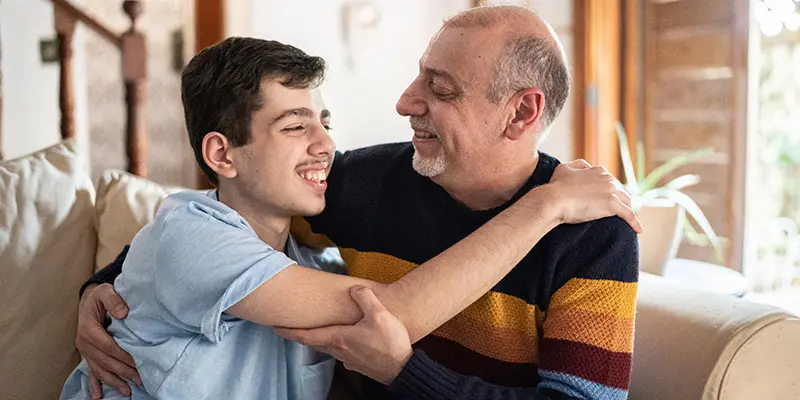
Communication problems, differences in social skills, learning challenges, behavioral issues—these are just some of the symptoms associated with autism. Symptoms can range from mild to severe with this condition that affects approximately 1 in 54 children but only an estimated 2.2% of the adult population (about 1 in 45 adults) in the U.S., according to statistics from the CDC. Autism symptoms can change over time—improving in some people and worsening in others. A child, teen, or adult’s daily habits, treatment, and support plays a major role in which direction symptoms evolve.
Autism symptoms can change over time—improving in some people and worsening in others. A child, teen, or adult’s daily habits, treatment, and support plays a major role in which direction symptoms evolve.
WHAT ARE THE SYMPTOMS OF AUTISM SPECTRUM DISORDER?
People with autism spectrum disorder (ASD) may experience a wide range of symptoms, including but not limited to:
- Limited eye contact
- Delayed language skills
- Delayed learning skills
- Delayed motor skills
- Lack of responsiveness
- Ability to focus intensely on certain things
- Difficulty comprehending social cues
- Trouble reading facial expressions
- Repetitive movements (such as rocking back and forth and hand flapping)
- Repeating words or phrases
- Dislikes or gets upset when routines change
- Engages in self-harmful behaviors (such as head-banging)
- Having difficulty playing with other children
- Withdrawn socially
- Having trouble carrying on a conversation
- Having a flat or sing-song tone of voice
- Increased or decreased sensitivity to sensory input (clothing, lights, noise, temperature)
Not all people with the condition will exhibit all of these symptoms and because autism is a spectrum disorder, symptoms may range from mild to severe.
HOW AUTISM SYMPTOMS CHANGE
Symptoms of ASD may change over time. Signs of the condition may emerge in the first year of life in some children or may not develop until a child is 2 or 3 years old. Some children initially meet developmental milestones but stop acquiring new skills or begin to lose skills they used to possess. For example, a youngster may begin to lose the vocabulary they once had. As a child ages, symptoms can change.
Whether symptoms worsen or improve often depends on a person’s treatment plan. With an effective treatment program that involves behavioral therapies, educational support, and lifestyle changes, many children’s autism symptoms improve as they age.
Exciting research from the Mind Institute found that nearly 30% of children who received substantial interventions showed reductions in the severity of autism symptoms at age 6 compared with age 3. In fact, in this 2021 study, which assessed 125 children diagnosed with ASD, some children no longer met the criteria for ASD by age 6.
This study builds on previous research showing that autism intervention can decrease symptom severity. A 2016 follow-up of a randomized controlled trial in The Lancet found that parent-mediated social communication interventions aimed at 2- to 4-year-olds with autism resulted in long-term reductions in symptoms. to clarify, parent-mediated therapy involves parents learning intervention techniques from professionals and implementing them with their children in daily life.
Similarly, a 2019 study in the Journal of Autism and Developmental Disorders involving 60 children diagnosed with ASD found that follow-up assessments after intervention showed significant improvement in autism symptoms and cognitive gains.
By contrast, when autism goes undetected or untreated, symptoms typically worsen as time passes. In addition, as children grow into adolescence and adulthood, they may develop mental health issues. A 2019 study in JAMA Pediatrics concluded that people with ASD are more likely to be diagnosed with depression, anxiety, and bipolar disorder compared with people who don’t have the condition. Other research points to an increased risk for ADD/ADHD and substance abuse among those with ASD. These issues can negatively impact a person’s quality of life and exacerbate negative symptoms.
AUTISM INTERVENTIONS
Because there is such a broad range of autism symptoms, treatment typically requires a multidisciplinary approach. Interventions may include:
- Behavioral therapies
- Communication therapies
- Supportive therapies
- Medications
- Dietary programs and nutritional supplementation
- Complementary therapies
Considering that children and adults with autism experience a variety of symptoms with differing levels of severity, no single treatment plan will work for everyone. Understanding your child’s (or your own) individual needs is key to finding the most effective solutions to mitigate symptoms.
BRAIN PATTERNS SEEN IN AUTISM SPECTRUM DISORDER
Autism is a brain-based disorder, and brain SPECT imaging research at Amen Clinics shows that it is not just one thing in the brain. On SPECT scans, which show blood flow and activity in the brain, there are different patterns of activity associated with ASD. The Amen Clinics database of over 170,000 brain scans includes scans from over 1,000 individuals with autism. These scans show high levels of brain activity in some individuals with autism and low activity levels in others with the condition.
Repetitive speech and behaviors, difficulty with changes in routines, and moodiness are more common in those with the overactive brain pattern of ASD. Learning problems, communication issues, and sensory processing abnormalities are more often seen in people with autism with underactive brain patterns.
Optimizing each of these brain patterns requires a different set of interventions. Knowing which brain type a child or adult with ASD has can be very beneficial in finding the most effective treatment program to improve autism symptoms.
Autism spectrum disorder and other mental health issues can’t wait. At Amen Clinics, we’re here for you. We offer in-clinic brain scanning and appointments, as well as mental telehealth, clinical evaluations, and therapy for adults, teens, children, and couples. Find out more by speaking to a specialist today at 888-288-9834 or visit our contact page here.





I found this article to be spot on. My son’s symptoms changed after puberty and he is closer to neurotypical most days. My challenge now is to continue to support him while investing in his adult freedom as much as possible. Family support/daily support is the key, we had no money for treatments/interventions.
Comment by Barbara — December 10, 2021 @ 5:13 AM
What’s an example of “repetitive speech”? Thanks.
Comment by Gail — December 10, 2021 @ 5:33 AM
Thank you for focusing on Autism Spectrum, so much more work needs done for therapy, anxiety and depression relief along with better life styles and direction for adult Asperger and autism spectrum. It is a huge challenge for families, especially those with you g adults over 18 whose mentality is more like 14-16. Age is not a true variant for autism spectrum and government and society should not treat them as they are 18 being capable of making their own decisions. Thank you for this focus and I hope ya’ll continued dedicated studies and work upon this subject matter through scientific strategies and proof of things we all can do for their future.
Comment by Camille — December 10, 2021 @ 5:42 AM
This article is deeply problematic, starting with the fact that it does not include the author’s name.
Autism is part of natural brain diversity and while it has disabling aspects to it, it’s not something that can be cured.
Emerging research shows there are no communication challenges when Austistics interact to each other. The breakdown occurs when an Autistic person is trying to communicate with a neurotypical person, similar to when someone who’s native language is Japanese, tries to speak in English. That person can learn English, but it will never come as naturally. The goal is not to turn the Japanese person into an English person, similarly we should not be trying to turn an Autistic person into a neurotypical person, which is what behavior management tries to do.
Behaviors such as stimming exist to help regulate the Autistic persons nervous system and is a form of expression. When behavior management therapies try to get an Austic person to stop stimming, that is when you start to see the co-occurring conditions of anxiety and depression, as essentially we are denying their humanity and are trying to turn them into someone they’re not.
It is also not true that one can outgrow Autism. There are just as many Autistic adults as there are children, they just have yet to be formally identified as Autistic. The reason is because understanding of Autism and how it manifests in different genders and cultures continues to evolve. The best way to support Autistic children and adults is to allow them to be who they are .
Sabrina
Mother of two Autistic girls not identified as such until late childhood, who also has Autistic tendencies and is married to someone with Autistic tendencies
Comment by Sabrina Alton — December 10, 2021 @ 7:02 AM
How to have a successful relationship with adult with Asperger. Very smart. claims he does not have Asperger however his Mother says he does as did his father
Comment by Joy — December 11, 2021 @ 3:02 PM
Thank you Sabrina. Your comment was spot on – I was disturbed by many things in this article also, especially the behavior therapy. My daughter was diagnosed as an adult, and has done a lot of her own research. This behavior therapy has been shown to not actually help the autistic person, and seems to be more for the benefit of others around the person.
Comment by Michele — August 16, 2022 @ 5:44 AM
I don’t have any friends they make fun on me
Comment by Ana Maria Herrera Zavala — March 10, 2023 @ 1:11 PM
I very much agree with Sabrina and just kind of wish we could address behaviors, etc, as they become problematic to the person themself . My Granddaughter was diagnosed with ODD when 6 years old. I kind of resent that people didn't just say, what is making her so angry ? and reach out to her that way. It is just plain easier I think to assume a PROBLEM rather than to address an individual.
Comment by Jean Williams — April 26, 2023 @ 8:51 AM
Hi, I’m Zia. I’m 10 years old and have autism. My autism has changed very severely since I was six. I have gone from needing lots of stimulation to being very sensitive to noise, lights, clothing, etc. my parents dont really get it, they are used to my not-so-severe autism and not to these newer symptoms. I’m not sure what to do, I have spoken to my best friend with ADHD and she seems to understand, but there’s nothing we can do about this situation, apart from talk about it. I’m worried what will happen if my autism keeps getting more severe as I get older. I’m also not sure if it’s normal for autism to change as significantly as mine. I can’t explain it to my parents and I really just need someone else to, someone who is better at using their words than me. Well, thanks , I’ve enjoyed reading this and I hope my reading skills don’t change if my autism does get more severe, cause I really love reading. Thanks, bye!
Comment by Zia — August 31, 2023 @ 9:33 AM
Haha Zia.. I doubt very much that 10 years old “Zia”wrote this nice try, however
Comment by Jim — October 7, 2023 @ 9:03 PM